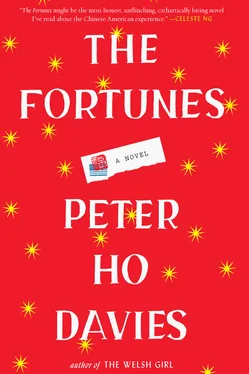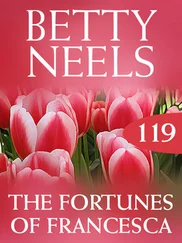It had happened once before, three months earlier. Then Crocker had duped them — called their leaders to the office over his store and, once they were spotted coming down the street, ordered Ling to walk in the front door, hustle out back, down the alley, then hell-for-leather it round the front again. “Over and over, mind,” Crocker had instructed. “As many times as you can before those fellows arrive. And see here, take your hat on and off betimes,” he called after him.
Ling had managed a half-dozen breathless circuits before Crocker welcomed the delegation on the boardwalk.
“What’s all the palaver?” he heard a mutton-chopped Irishman ask Crocker as they shook hands. “You running an opium den, is it now, Captain?”
“Hiring,” Crocker told him serenely, nodding curtly to Ling as he led the men upstairs to his office. “Plenty more where he came from too, so I hear.”
The men had been back to work within the day. “Credulous bog-trotters!” Crocker had guffawed, watching them go, his chain and fob jiggling with mirth. Ling had allowed himself to join the laughter, marveling that anyone could be so stupid as to mistake one man for a multitude, delighted by the thought of the men’s ignorance, their inability to tell one Chinaman in his bamboo hat and baggy cotton suit from another, being turned against them. He thought he’d be able to smile now whenever a ghost called him John (though shortly he’d start to hear a new epithet in the streets: scab ).
And then Crocker had added, clapping him heartily across the back, “As if you little Chinaboys could undertake such hard labor.” Ling had staggered a little under his meaty paw, making Crocker bark with laughter.
But now these same fellows were calling Crocker’s bluff.
One morning a few days after the new year, Crocker had come prowling into the kitchen before sunup. Ling had been preoccupied, thinking of the long-ago cricket the old gangster had given him, the dry rattle of it in its bamboo cage after it died. Big Uncle was a spirit, Aunty Bao had written, “dead of a curse,” and then reminded him of the outstanding debt be owed for his passage. Ling had immediately dispatched a sum — asking for a paper servant to be burnt at Qingming so that the dead man might be well attended in the afterlife — and realized he’d never write home again (nor send another cent; his debt was to the dead man, he figured, and he knew himself to be untouchable under Crocker’s roof). He was free, and yet he’d wept, so silently he’d hardly been sensible he was doing it, until he heard the household waking, and then he’d scuffed the tears away as if ashamed.
He roused himself when Crocker appeared. The big man, restless and irritable, had been looking for coffee, and Ling hurried to set the pot on the stove. But even after he’d set a cup before his employer, Crocker had merely sat and watched, the wooden chair creaking under him as he rocked, while Ling tended the laundry kettles, hauled in firewood, all the time terrified the chair would give way and Crocker crash to the floor, splashing coffee on his clean shirt. Ling was in a sweat worrying what the man wanted, but after slowly slurping his coffee, pursing his lips as if to draw the last of it from his beard, Crocker merely slapped his thighs and bustled out. Ling had sunk into the chair in silent relief.
The next morning, though, Crocker had come out onto the back porch, two of his business associates with him: Stanford, the former governor, a frequent dinner guest, as sleekly plump in his nankeen trousers and morning coat as one of his prized thoroughbreds, and another gentleman in a sack suit, leaner and with a leather eye patch, whom Ling didn’t know. They talked among themselves, smoking—“The Metropolitan Railway already has four miles of tunnels under London, for Pete’s sake!” “Underground ain’t the same as under mountains, boss”—but Ling could feel their eyes on him, appraising, as he chopped wood. Once, on the stump, Stanford had called the Chinese “a degraded race” and “the dregs of Asia” (Uncle Ng had liked to quote the phrase whenever they emptied their laundry tubs), vowed to drive them out of California, declaiming an animosity that Crocker confided went back to the gold camps. “Leland took it as an affront that some of your brethren struck pay dirt when he didn’t: American gold for American pockets is his view.” Ling always stood a little straighter around him, at once haughty and trying to impress the man, though as far as he knew Stanford had never noticed him before (at dinner the man’s conversation was only of horses, once contending against all the rest that a galloping steed took veritable flight, all four hooves off the ground. Imbecile, Ling had concluded).
And then finally one of the three — the fellow with the eye patch — told him to come forth. The man — Strobridge, Crocker called him — planted himself before Ling, pummeled his shoulders, pinched his arms. It felt odd to Ling to look a one-eyed man in the face, especially as the fellow cocked his head to one side, as if listening rather than looking. Ling stared at the man’s jaw instead, the wad of tobacco bulging and bobbing in his cheek, until he started to imagine it was the missing eye rolling around in there. He made himself focus on the sole good eye then, and it felt like gazing down a long tunnel. Strobridge finally thrust a bushel basket into his arms, piled it high with billets, then made Ling totter around the yard with it. But after a single staggering circuit Ling had lowered the burden and the other two men had looked at Crocker pityingly, the one-eyed man hawking in the dirt, his dusty ball of juice rolling between Ling’s feet.
“Know what the men call ’em? Wongs. On account, two Wongs don’t make a white.”
Stanford, beneath his top hat, chortled into his beard—“Don’t look to me, Charles. My competence is horseflesh, though by that measure I’d say you’re trying to sell us a nag”—and Ling wished he’d choke on it. He began to empty the basket to puzzlement, then outright laughter as he transferred a portion of logs to a second basket. “Who’s he think’s going to carry that ’un?” Strobridge snorted, pushing his straw skimmer off his brow. “I told ye they’re not worth half a man. Beats me how they built that there Great Wall.” But Ling had pulled his old bamboo carry pole from beneath the porch and threaded the handles of first one and then the second basket onto it, crouched between them, and raised the balanced load across his shoulders. The baskets bounced lightly in time with his strides, giving a little spring to his step as he circled the yard. You’d have thought he’d produced the Monkey King’s golden-clasped rod, such was the astonishment. Crocker nodded vigorously while Strobridge and even Stanford clustered around and tossed more wood into both baskets. “Stand fast,” Crocker told Ling, and so he had, even when pearls of sweat had sprung from his brow.
“Are all coolies strong as you, boy?” Stanford asked. The man had recently had a giant sequoia named for him, before that a mountain. Up close he smelled faintly of horse.
“Yessir,” Ling began. “ K’u-li is Chinese for—”
“Coolie,” Stanford repeated slowly. “Coo- lie. ”
He’s correcting my pronunciation, Ling realized.
“Yessir. Most Chinese strong as me.”
He had wanted to explain that k’u-li in Chinese meant “hard strength.”
Strobridge and Crocker exchanged a glance. The former rubbed his hands together and the latter, thumbs hooked in his vest pockets, cried, “Bravo! What did I say, Stro? They’re from China, not made of it!” And Ling, muscles still braced under his load, had trembled with pride.
Читать дальше












